CEO Sean Collins on the launch of hybrid vessel Earth Clipper and forthcoming cross-river services
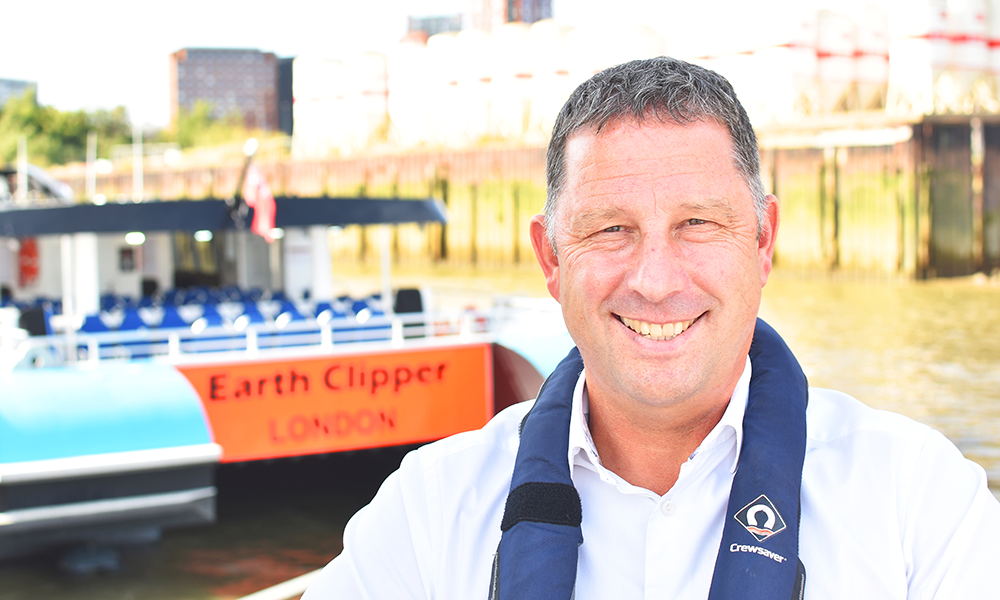
Subscribe to our free Wharf Whispers newsletter here
The passenger craft Sean Collins has been running on London’s great river have always had a futuristic edge to them.
Starting with three Hydrocats in 1999 – each able to carry 62 people from Greenland Pier in Rotherhithe into the City – the zippy little twin-hulled craft helped carve out an image of Docklands’ modernisation that boosted the area’s ongoing regeneration.
As Canary Wharf, east and south-east London have grown and developed – so too has the river bus service, now based at Trinity Buoy Wharf.
Today, the vessels in Uber Boat By Thames Clippers’ fleet are larger – long slender craft that hug the water as their engines blast them rapidly along.
While to the untrained eye, the sleek lines of the 220-passenger vessels might appear similar, don’t be fooled.
There’s change afoot – a journey that started with the arrival of Venus Clipper in 2019 as the service targeted green improvement.
The next step on that path, somewhat delayed by the pandemic, was the recent launch of Earth Clipper – a vessel that is aesthetically similar to the rest of the fleet, but is also completely different.
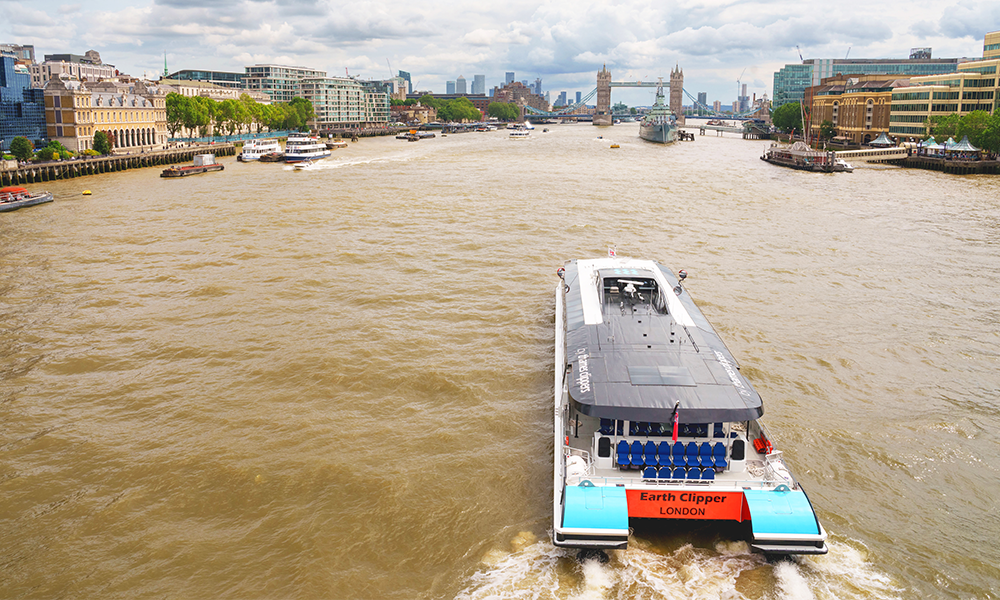
Firstly, at 40 metres long, she can carry an extra 10 passengers.
But this is a mere tweak in comparison to the main difference – the way she is propelled. Earth Clipper uses a hybrid combination of electric power and biofuel power to slice through the brown waters of the Thames.
In central London, she uses only an electric motor with a biofuel engine kicking in out east to recharge her batteries and push water through her jets.
“Earth Clipper has been just under three years in the making.
“We started working on the specification in 2019,” said Sean, CEO of Uber Boat By Thames Clippers.
“We needed extra capacity, to be able to serve our routes with the expansion down to Barking – the increasing volumes that were there and those in the pipeline, such as Battersea.
“We’d just commissioned their predecessor – Venus Clipper – and we were already focused on reducing weight and therefore power in that vessel.
“That was already a 20% emissions improvement on the core boats in our fleet for the same carrying capacity.
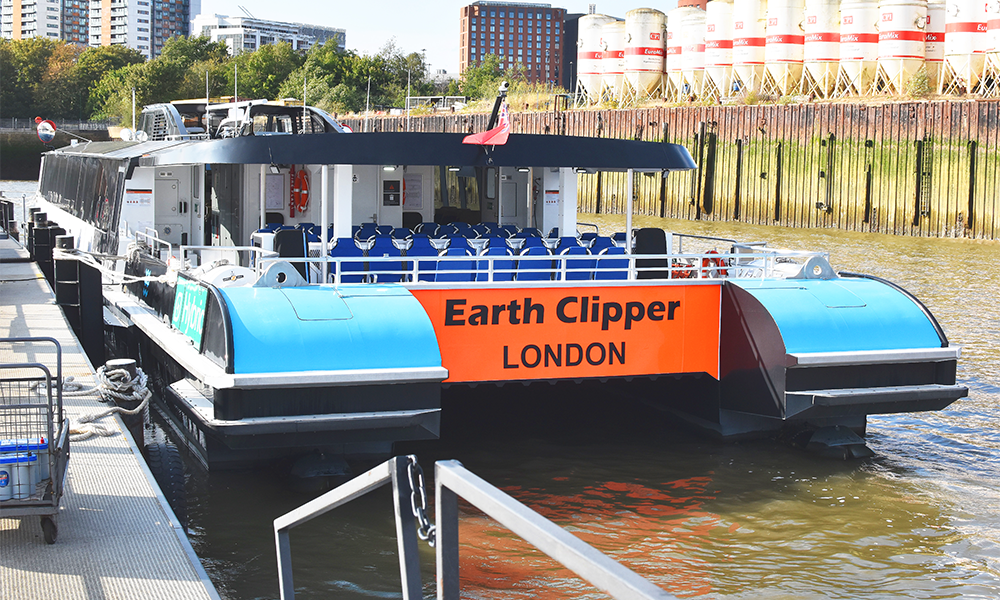
“With that one, we were asking how we could make the boat lighter while providing an enhanced level of comfort and all the facilities our passengers expected.
“We worked on that whole design with 123 Naval Architects and came up with Venus.
“From that, we decided we had to move it on to the next level.”
The drive to do that came from the company’s goal to cut carbon emissions by 50% by 2030 and to achieve net zero for the overall business by 2040.
Sean said: “Boats have to last 25-30 years – they haven’t got a similar shelf life to most other above ground vehicles.
“With that in mind, to reach our sustainability goals, we realised we had to have a significant step forward.
“We looked at the options, took a lot of data from the operating profile of Venus and used it to establish what might be achieved by using a hybrid model.
“From that, we realised we were not going to be able to achieve 100% battery power at high speeds, but that we could when going more slowly, as we do in central London.
“We formulated a specification and went to the shipyard that had built our previous five vessels and signed contracts to move on with building Earth Clipper.
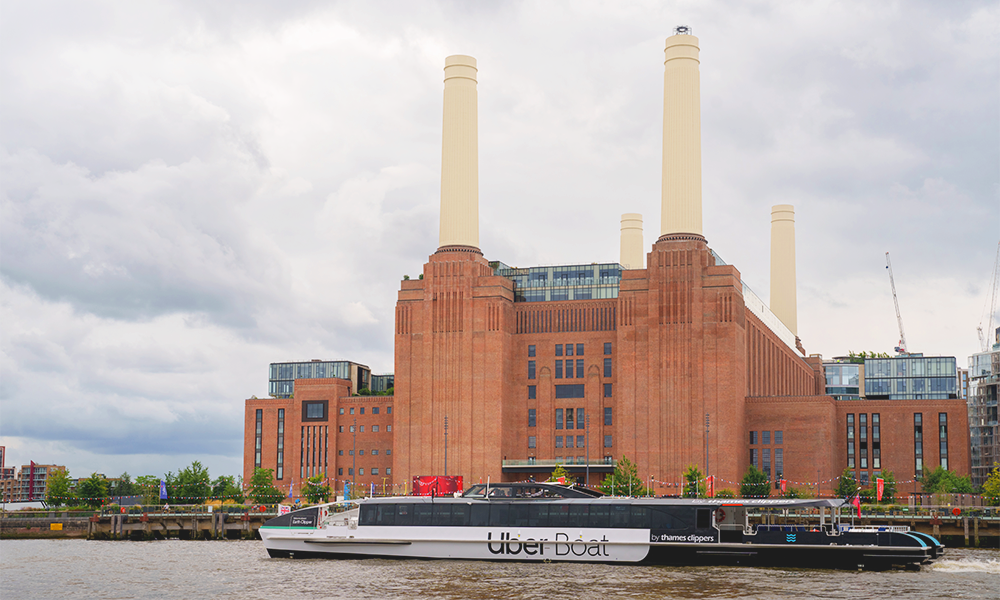
“It does exactly what we wanted it to do.
“The model has resulted in a 90% reduction in our CO2 emissions and a 65% drop in oxides of nitrogen and sulphur.
“Those are figures based on measurements we’ve taken during actual running on the Thames.
“There are two more in build – Celestial and Mars – which will both have joined the fleet by spring 2024.
“We all have a duty of care and a duty to deliver on improving the environment.”
There are other benefits too.
Earth and its two sister ships hail from the Wight Shipyard Co on at East Cowes on the Isle Of Wight – a boost to the local economy with 65 people involved in their construction, including 14 apprentices.
There are also other operational benefits closer to home – welcome news as passenger numbers are already exceeding levels seen in 2019.
“Earth is significantly quieter and smoother on battery and that’s even the case when the engine is running,” said Sean.
“From a noise perspective, it’s a significant improvement and there’s absolutely no compromise at all from the customer’s point of view.
“The seating is also an upgrade in design – we’ve managed to make all 230 lighter, improving the efficiency of the vessel.
“We had to add nearly nine tonnes of additional weight with cabling, batteries and the motor to enable us to use this method of powering the boat.
“So that’s a process we’ve been through with every component.
“When stepping on Earth Clipper, we feel a sense of achievement.
“We’re really inspired by feedback from the public and also the crews that are working on the boat.
“They really love it – the technical advances and the sense of having taken that step forward.”
The use of battery-only power in central London equates to an extra 16.5% reduction in emissions in comparison to using the biofuel engine alone.
In the future, Sean said hydrogen would likely provide further cuts in emissions as electrical power was currently impractical as a way to deliver high speed services on the river, given the charging times needed.
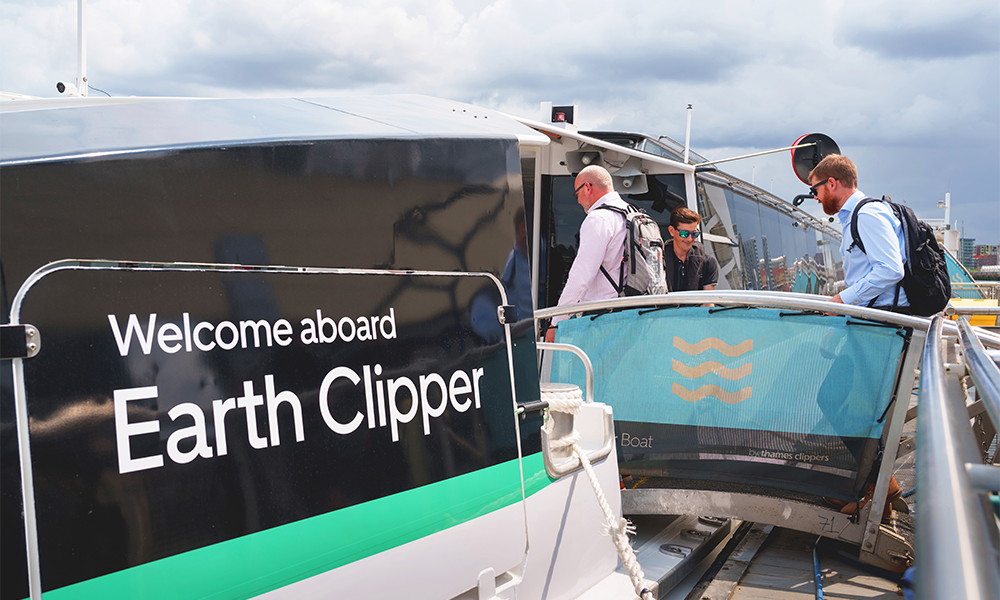
A Rotherhithe – Canary Wharf Crossing
However, Uber Boat By Thames Clippers is also pressing ahead with plans for an all-electric cross-river service for pedestrians and cyclists.
The aim is to have this up and running on the company’s Rotherhithe-to-Canary Wharf route by spring 2025 and then use it as a template for similar services elsewhere.
Sean said: “We’re committed to delivering that as part of our plans to invest £70million in new boats up to 2030.
“There are also opportunities between Silvertown and Charlton as well as Thamesmead and Barking in the east.
“We’re also aiming to add more stops including a pier that has planning permission at Blackwall Yard, which the developer will hopefully build over the next few years.
“One of the things that happened over the pandemic is that more people discovered the river and we’ve had three record days this year.
“Our figures for 2022 were higher than 2019 and Canary Wharf, for example, is thriving. The footfall at that pier is exceeding pre-Covid levels.”
Find out more about Uber Boat By Thames Clippers here
Read more: Sign up for the Santa Stair Climb at One Canada Square
Read Wharf Life’s e-edition here
Subscribe to our free Wharf Whispers newsletter here
- Jon Massey is co-founder and editorial director of Wharf Life and writes about a wide range of subjects in Canary Wharf, Docklands and east London - contact via jon.massey@wharf-life.com



